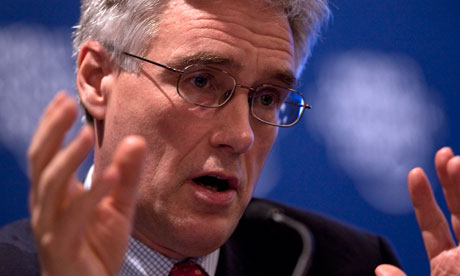A bad week for banks (or their customers), Italy trounces Germany (at the euro summit) and Brits put their faith in Spain (well, its beaches)

Lord Turner, chairman of the Financial Services Authority, said that the failure of the banks was 'a public concern'. Photograph: Bloomberg/Bloomberg via Getty Images
Ever since the taxpayer was forced to bail out the UK's banks, there has been a steady stream of commentators asking why none of the bankers involved have had their collars felt. This week the government will wade in when it responds to the Financial Services Authority's report on the collapse of Royal Bank of Scotland. George Osborne is set to launch a consultation floating the idea of criminal sanctions against directors of failed banks where there is evidence of negligence.
When the FSA's hefty 452-page report was published last December, Lord Turner, its chairman, said that the failure of banks was a "public concern" because their collapse resulted in "taxpayer losses and wider economic harm".
He added: "The fact that no individual has been found legally responsible for the failure begs the question: if action cannot be taken under existing rules, should not the rules be changed for the future?"
Well, change looks to be coming, helped along by the interest rate rigging scandal, which has helped pull confidence in the country's banks down to a new low. Sadly those at the helm of the banks bailed out in 2008 – like Fred Goodwin and Andy Hornby – have nothing to fear. Only future bank failures will be covered.
Mario trounces Merkel
Spain and Italy may be meeting on the pitch in Kiev on Sunday nightcorrect to decide who will be crowned champions of Europe but the fixture that really mattered was played in Brussels in the early hours of Friday morning, when Italian prime minister Mario Monti and his Spanish counterpart Mariano Rajoy ganged up on Angela Merkel at the latest make-or-break eurosummit.
Early reports suggested defeat on as well as off the pitch for the German side after the two "super Marios" (Balotelli and Monti) played a blinder.
But shrewd observers of the euro-scene suggest Merkel plays the long game and may prove to be less keen on putting German taxpayers' money at risk than she appeared, with Italy and Spain's hopes of no-strings-attached bailouts likely to be dashed in the coming months as the crisis moves into extra time.
So perhaps it's fortunate that, fresh from his honeymoon with Treasury brainbox Eleanor Shawcross, Next boss Lord Wolfson will ride to the rescue of our eurozone friends this week, awarding £250,000 to the winner of the Wolfson Prize (named after his dad) – for the economist with the best plan for breaking up the single currency.
It's looking up for budget airlines
It's chocks away this week as the major airlines line up to report their June traffic figures, with Ryanair up first on Tuesday. Analysts say that despite fare increases, the big (lack of) summer getaway has begun as Britons look to escape the wettest hosepipe-ban weather they can remember.
HSBC's Andrew Lobbenberg predicts that passenger numbers at Michael O'Leary's no-frills carrier will be up in the mid-to-high single digits, with the proportion of seats sold per flight down slightly on a year ago, albeit at a still healthy 84%. Even easyJet, embroiled in a lengthy airport bar brawl with founder Sir Stelios Haji-Ioannou, is doing well despite the distraction, with HSBC predicting passenger numbers will be up more than 10%, with flights 89% full.
British Airways owner International Airlines Group will report its figures on Wednesday.
"June has been a month with dismal weather in northern Europe, dismal economic developments in southern Europe and football in eastern Europe," explains Lobbenberg. "We would thus expect decent leisure traffic from the low-cost carriers, with the lousy weather and jubilant public holidays in the UK making Spanish beaches very appealing."
No comments:
Post a Comment